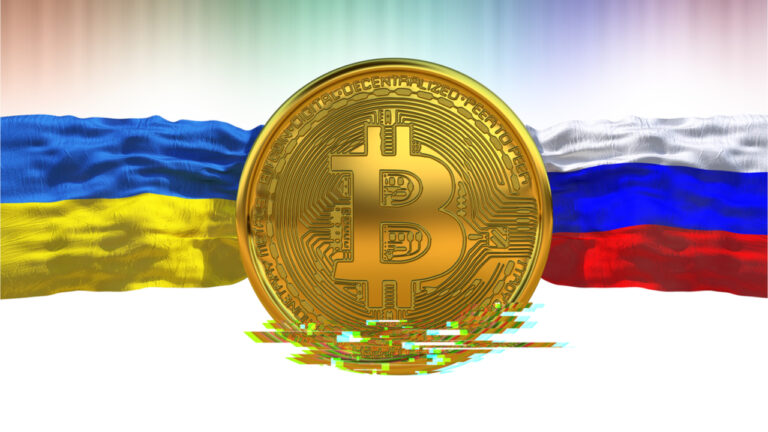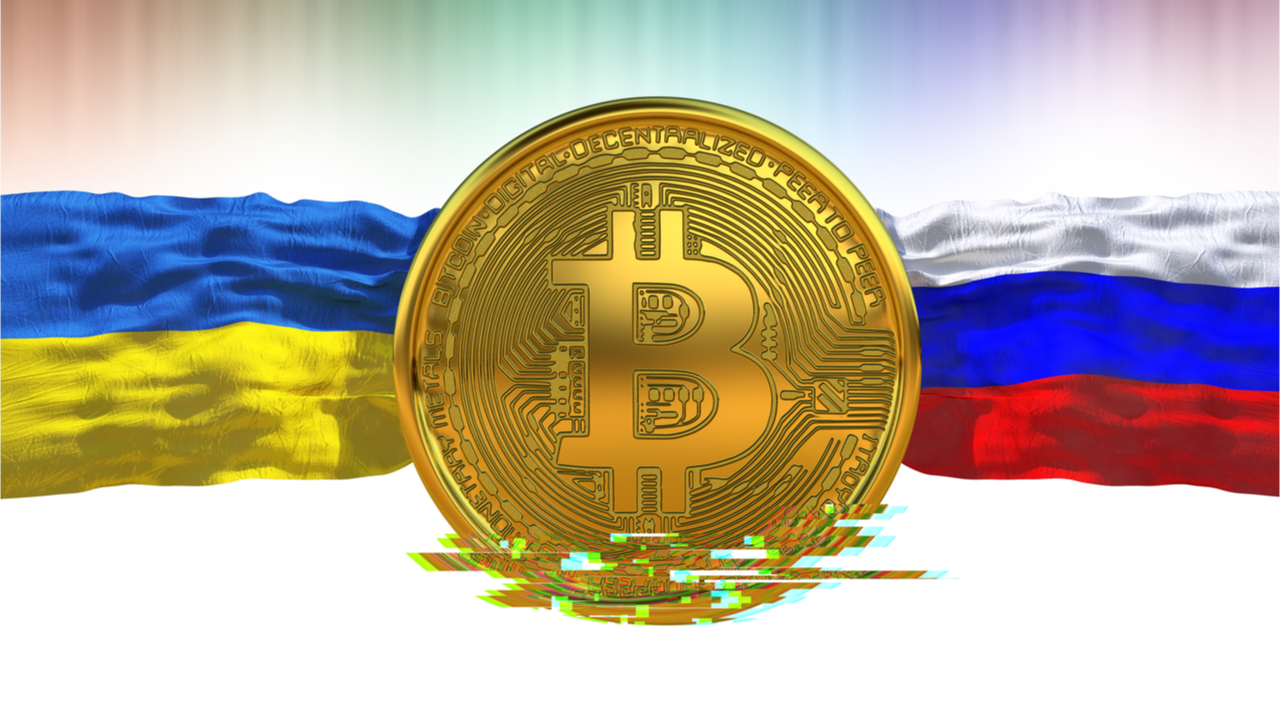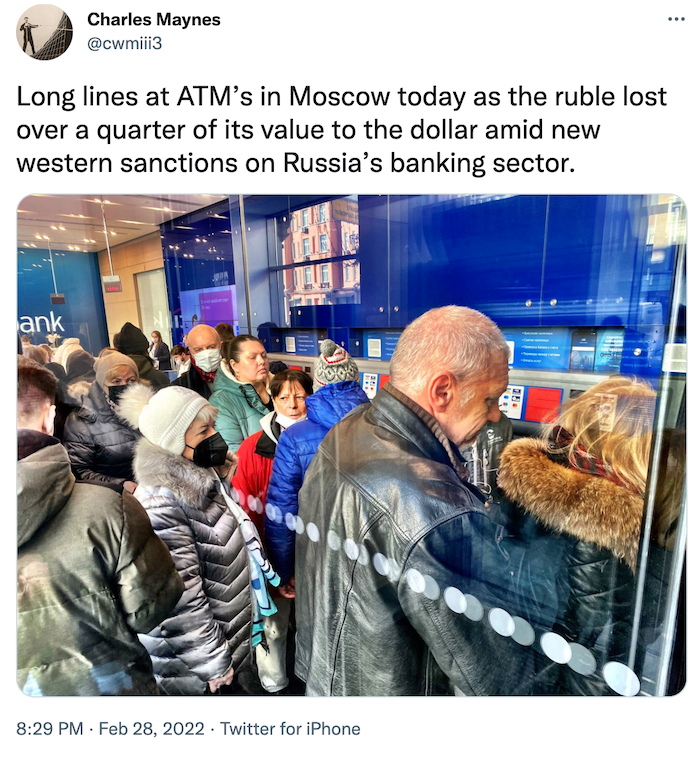
[ad_1]

Decentralized networks such as Bitcoin’s don’t know national allegiance, they only know math. And when you’re trying to get your savings out of an ATM, or send a payment to relatives in a war-torn environment, someone else’s politics is the last thing you want standing in the way of you and your loved ones’ well-being — regardless of what colors may be on the flag waving above your head.
The Human Cost of Sanctions
There are no winners in war. Bankers and politicians start them, and everyday individuals like you and I are told to suffer, fight, kill one another, and die.
Picture this: You live in Russia. The value of your money — the ruble — is tumbling. What’s more frightening are the long lines forming in front of ATMs and banks, and the confusion at public transportation hubs as major corporations like Google and Apple are restricting services, while major banks are cut off from the SWIFT payments network.
While you are completely against war, and even have relatives in the Ukraine, according to many media reports you are their sworn enemy. Even the institutions you somewhat trust, such as forward-thinking cryptocurrency exchanges, are being pressured to “sabotage ordinary users” by top-ranking government officials. This is the nature of sanctions.

Luckily, true, decentralized crypto is still available as an option to move and preserve value. Just have a look at all the honking for peace that recently went on in Ottawa, Canada. In the Ukraine, too, as your relatives seek shelter in the midst of a conflict they never asked for, they are being aided by crypto donations that aren’t subject to arbitrary borders drawn by politicians. Heck, the government itself is asking. Crypto is a tool. It can be used by anyone, for better or for worse.
No matter what the major news outlets are shouting about, or which side is viewed as right or wrong, you can continue to control your money.

Sanctioned Areas Globally See Individuals Turn to Crypto
The ripple effect of the new wave of so-called western sanctions against the people in Russia is already being braced for. As Bitcoin.com news reported just this week, some economists in Venezuela are already predicting trouble for Venezuela’s banking system (and in effect, of course, people), as major Russian banks are now being banned from accessing SWIFT. Venezuelan economist Jose Guerra took to Twitter to explain:
Any country with significant financial ties to Russia will likely feel the sting of restrictions on trade.
Moving up to Cuba, a country whose residents have had to deal with U.S. trade embargoes for decades, one can also see the impact of restrictions on free trade. And because of this, crypto has historically been a valuable tool here as well.
A Reuters report from back in 2019 notes that the “roll-out of mobile internet nearly a year ago has opened the way for cryptocurrency transactions, and enthusiasts have multiplied as the currency helps overcome obstacles created by U.S. sanctions on Cuba.”
The report tells of a small business owner who was able to purchase parts for his mobile phone repair shop online with crypto, which were unavailable in the local economy. Computer scientist Adrian C. Leon also emphasized in the same article:
For foreigners, cryptocurrencies is just another option, but for Cubans it is a necessity and can be a solution to their exclusion from the global financial community.
The nation of Iran has become a hot topic as well, when it comes to the heated debate about sanctions and crypto. A 2021 report by the Iranian think tank Presidential Center for Strategic Studies suggested that newly-minted bitcoins could be leveraged for the purpose of trade beyond geopolitical restrictions. The report detailed:
“As the newly-extracted bitcoins are not easily traceable, despite the pressure of sanctions on the country, domestic economic actors can use newly-extracted cryptocurrencies, which are preferable to existing bitcoins, on international exchanges.”

Draconian Calls to Stifle Crypto Freedom Increase
Of course, countries typically viewed in western media as terroristic using cryptocurrencies to slip sanctions is seen as a major problem.
“You either need to regulate them or ban them. I don’t think there is a middle ground,” Informed Choice chartered financial planner Martin Bamford stated in an Express interview from May 2021, speaking about potential cryptocurrency tax havens. He further noted: “A global crypto currency tax or a global crypto currency regulation ban would be the most effective way of doing it, but only if you can get all the countries on board.”
When Bamford was asked which governments might not cooperate, he answered: “Russia, China, or Iran.”
Bamford’s prescription seems to be taking shape and gaining currency (no pun). Just last month, global investment bank JPMorgan’s managing director and head of Regulatory Affairs, Debbie Toennies, declared: “I do think we need a globally consistent regulatory framework. It’s important that we get to a solution as quickly as possible.”
Other notable forces calling for global regulation are European Central Bank Chief Christine Lagarde and leading centralized cryptocurrency exchange Binance. For her part, Lagarde retreated to the tired trope of crypto being the money of criminals, stating:
“It’s a highly speculative asset, which has conducted some funny business and some interesting and totally reprehensible money laundering activity.”
Of course, these arguments have been laid to rest by statistics several times over, with fiat’s financing of illicit activity massively dwarfing Satoshi’s supposed contribution to crime. And this crime itself is all too often defined by corrupt lawmakers, and not any logical, ethical compass.
When we’re dealing with the caliber of folks who proudly state that literally starving 500,000 children to death is “worth it” for sanctions’ sake, we’d do well to take giant step back and reevaluate.
Thus Spoke Satoshi: for Humanity’s Sake
The German philosopher Friedrich Nietzsche famously said of governments:
A state, is called the coldest of all cold monsters. Coldly lieth it also; and this lie creepeth from its mouth: ‘I, the state, am the people.’ It is a lie! Creators were they who created peoples, and hung a faith and a love over them: thus they served life. Destroyers, are they who lay snares for many, and call it the state: they hang a sword and a hundred cravings over them.
That sword, those snares — just look at the SEC. Look at the IRS. Look at the central banks of the world and the governments and money they weaponize. These are not the creators Nietzsche is speaking of. These creators are the innovators, the dreamers, and the developers of protocols and code that allow for free worldwide trade regardless of political affiliation or lack thereof.
If the goal of regulators is truly “financial inclusion” and the fostering of innovation while protecting investors, why do they seek so desperately to cut the one promising economic lifeline the poor and struggling of the world have right now, and strangle it with red tape? I think we all know the answer.
Crypto uses math, not fear-mongering. And thus, it is a threat. It’s a neutral tool like any other. It can be leveraged for both good and ill. There are numerous non-violent ways for communities to choose how they do or do not wish to leverage and/or regulate these technologies, without state laws or other such arbitrary, violence-backed decrees.
As Kraken CEO Jesse Powell said last week:
Our mission is better served by focusing on individual needs above those of any government or political faction. The People’s Money is an exit strategy for humans, a weapon for peace, not for war.
So please, donate to those who need it. In Russia, in Ukraine. Anywhere. Even where someone with political-fueled ignorance tells you not to. Nobody can stop the movement of peer-to-peer electronic cash, short of shutting down the internet or violently wresting your keys from your possession. And at that point, we’ll need to finally address some very fundamental elephants in the room, anyway.
What are your thoughts on economic freedom in the context of the current global situation? Let us know in the comments section below.
Image Credits: Shutterstock, Pixabay, Wiki Commons
Disclaimer: This article is for informational purposes only. It is not a direct offer or solicitation of an offer to buy or sell, or a recommendation or endorsement of any products, services, or companies. Bitcoin.com does not provide investment, tax, legal, or accounting advice. Neither the company nor the author is responsible, directly or indirectly, for any damage or loss caused or alleged to be caused by or in connection with the use of or reliance on any content, goods or services mentioned in this article.
[ad_2]
Source link